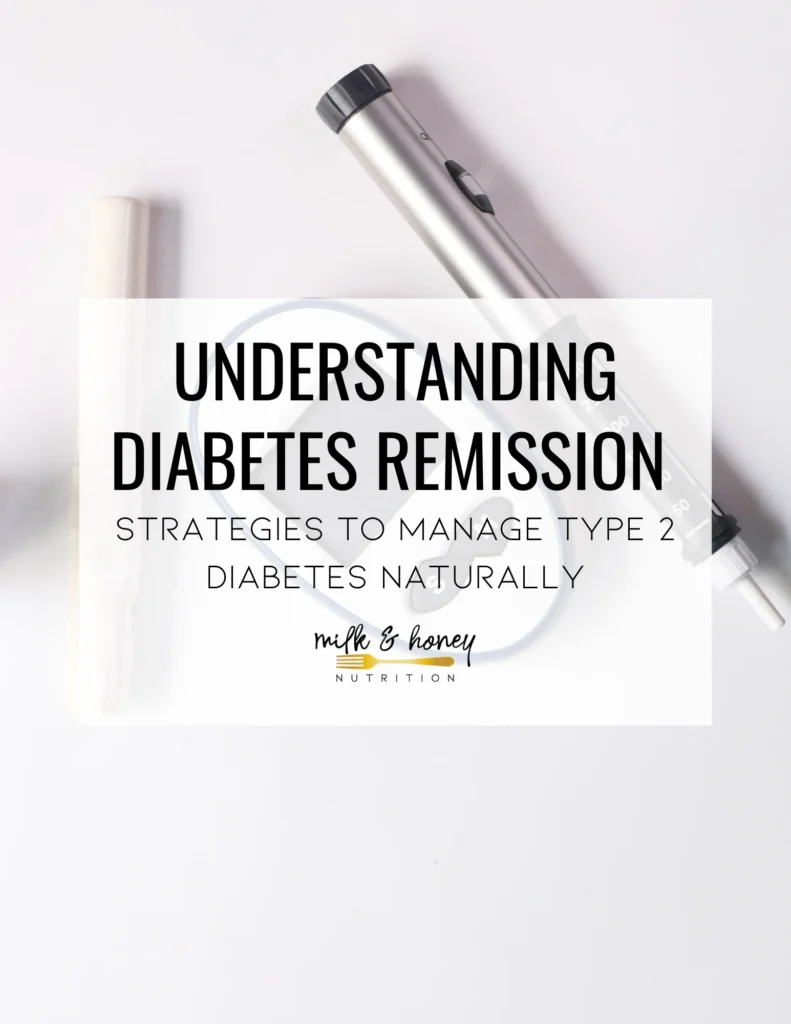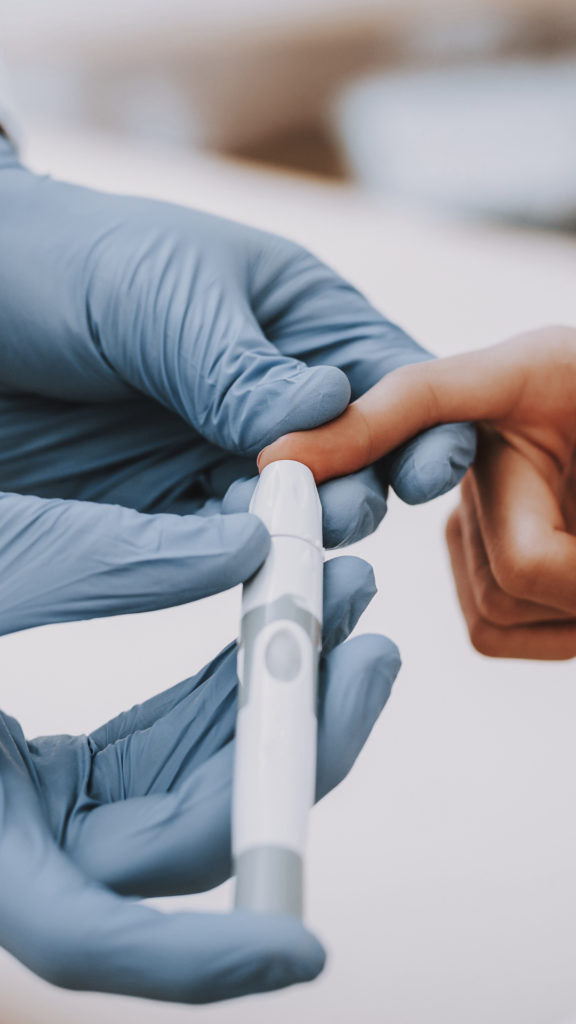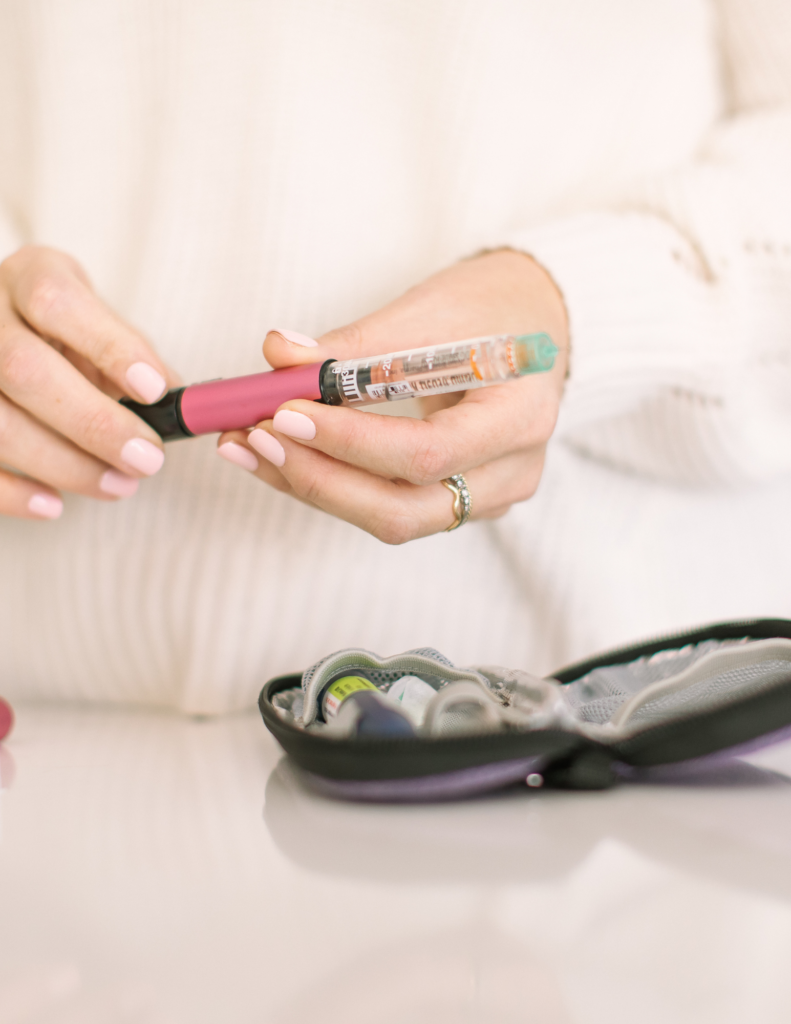
In this article we cover what diabetes remission is and recommended strategies for achieving diabetes remission. And, why we prefer to use the term remission instead of cure.
What is diabetes remission?
The American Diabetes Association defines diabetes remission as “…a return of HbA1c to less than 6.5% that occurs spontaneously or following an intervention and that persists for at least three months in the absence of usual glucose-lowering pharmacotherapy.” So, essentially, someone is considered in diabetes remission when they have normal HgbA1c levels for three or more months without the use of diabetes medications.
Can diabetes go into remission?
Yes, type 2 diabetes can go into remission for some people. Prior to 2021, there wasn’t an agreed-upon definition for terms like diabetes remission or diabetes cure. But we knew people could reach a point where they were managing prediabetes and type 2 diabetes without medication-related interventions.
The American Diabetes Association formed an expert panel to decide on exactly what this term should mean, and that is where we get the definition above.
Diabetes remission v. diabetes cure
As a registered dietitian who helps people living with diabetes, I agree with their choice to focus on the word remission and not cure. Remission acknowledges that the diabetes is still there, but at this time (temporarily) medication is not needed. A “diabetes cure” implies that diabetes and associated elevated blood glucose values are gone.
By using the word remission they acknowledge two things:
- That medication is not needed at this time, but may be again in the future.
- There are some elements of diabetes that may still be present and are successfully managed by non-medication strategies.
*The term diabetes reversal is also sometimes used. This term is more appropriate for people diagnosed with prediabetes, and who do not yet have type 2 diabetes. At this point in time (prediabetes), many people can truly reverse any changes that may have occurred to the endocrine system or to their body’s ability to utilize insulin and maintain healthy blood sugar levels. But, once someone has been diagnosed with type 2 diabetes, a complete reversal back to normal is not possible usually. Though, management without medication (remission) might be.
Type 1 diabetes remission
Remission with type 1 diabetes does not exist. When people are diagnosed with type 1 diabetes, they will need to utilize injected insulin for the rest of their lives. At this point in time (2024), widely available treatments to re-grow or repair beta cells in the pancreas that are damaged because of type 1 diabetes do not exist.
Type 2 diabetes remission
The definition for diabetes remission listed above refers to prediabetes and type 2 diabetes. In addition to confirmed HgbA1c levels less than 6.5% for three months or longer, the American Diabetes Association recommends repeat testing at least yearly to confirm a patient is still in remission.

Diabetes remission criteria
To confirm someone is in diabetes remission, they should:
- have their HgbA1c tested immediately before starting a non-medication behavioral intervention to reduce blood glucose levels
- repeat testing to determine the effectiveness of the intervention should happen no sooner than three months later
What A1C is considered remission?
Hgb A1c levels less than 6.5% and sustained for three months without the use of medication meet the criteria for remission. If a reliable Hgb A1c value is not available, the American Diabetes Association states that “fasting plasma glucose of less than 126 mg/dL (<7.0 mmol/L) or estimated HbA1c less than 6.5% calculated from continuous glucose monitoring values can be used as alternate criteria.”
How to put diabetes into remission
Now that we understand what diabetes remission is (and is not), how do we get there? Research and various diabetes organizations have identified several strategies for achieving diabetes remission.
Spontaneous diabetes remission without a targeted intervention is not common. One study estimates that only about 1.6% of people living with Type 2 diabetes experience diabetes remission.
But, in looking at the different studies conducted around diabetes interventions and diabetes remission, two factors seem to be more closely tied to achieving diabetes remission than others:
- Time since diagnosis
- Weight loss
Time since diagnosis
As time goes on from diagnosis, the likelihood of achieving diabetes remission decreases. People who have been diagnosed with diabetes for less than two years are more likely to achieve remission than those who have been diagnosed with diabetes for longer periods.
Weight loss >10% of body weight
Weight loss also greatly increases the odds of achieving remission. One study published in January 2024, found that people who lost 10% or more of their body weight within one year of being diagnosed with type 2 diabetes were 3x more likely to achieve remission.

Dietary changes to support remission
Dietary strategies that promote blood sugar balance and weight loss should be prioritized for achieving diabetes remission. Many different dietary strategies exist that can lead to weight loss while also promoting healthy blood sugar levels. Some of these include:
- Low-calorie diet
- Restricted/low-carb diet
- Low-fat diet
- Intermittent fasting
- Meal replacement plan
- Mediterranean diet
- Plant-based diet
All of these diets show some evidence of helping people with type 2 diabetes lose weight and promote stable blood sugars. But which plan or method a person should pursue depends on their unique needs. People with type 2 diabetes looking to achieve remission should work closely with their healthcare team, including a registered dietitian, to determine what is best for them.
Lifestyle factors supporting remission
Other factors that should be prioritized to help promote a healthy weight and healthy blood sugar levels to achieve diabetes remission include:
- Getting adequate amounts of sleep
- Reducing stress levels
- Moving your body frequently
- Limiting alcohol
- Not using tobacco products
Involvement of healthcare professionals
Regularly checking in with your healthcare team can help keep you on track with your diabetes goals, and make it more likely that you’ll succeed at achieving remission. Ask your healthcare team what is best for you to help you meet your goals.
How long can diabetes remission last?
Much of the research available suggests that it is difficult to achieve and maintain diabetes remission long-term, and cites the need for ILI (intensive lifestyle interventions). But, the same themes persist… the sooner diagnosis interventions are put in place and the greater amount of weight loss (when needed), the stronger the likelihood of both achieving and maintaining remission.
Regularly meeting with your healthcare team is essential for long-term successful diabetes remission.
Sources
- https://diabetesjournals.org/care/article/44/10/2438/138556/Consensus-Report-Definition-and-Interpretation-of
- https://diabetesjournals.org/care/article/47/1/47/154002/Type-2-Diabetes-Remission-A-New-Mission-in
- https://journals.plos.org/plosmedicine/article?id=10.1371/journal.pmed.1004327
- https://doi.org/10.1016/j.dsx.2024.103096
- https://www.diabetes.org.uk/about-diabetes/type-2-diabetes/remission/diets-for-type-2-diabetes-remission
- https://pubmed.ncbi.nlm.nih.gov/25231895/





